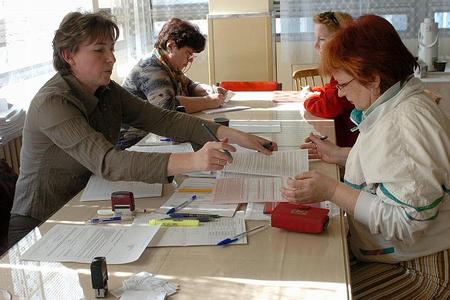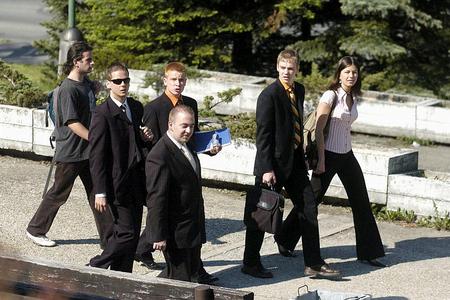Career and HR, page 21
Employment news from Slovakia
Retraining improves jobseekers chances
The economic crisis has already left a large number of Slovaks jobless and the prospect for the near future is gloomy with unemployment expected to grow higher over much of 2010. Another piece of bad news is that the number of vacancies is very low, providing just a small chance that jobseekers can find a job in their previous profession. Retraining programmes provide new skills or enrolling in formal education courses to broaden one’s base of knowledge is a way for unemployed persons to improve their chances at reintegration into the labour market.
Unemployed wait for better times
Unemployment has been hitting record levels across Europe and Slovakia is no exception, reporting a jobless rate returning to two-digit levels for the first time in many years. The country, with its open and export-oriented economy, has been strongly affected by declining orders from abroad and now is waiting for the economies of Slovakia’s main trading partners to recover and lead to the first positive signals for Slovakia’s labour market.
Facing the challenges of change
Companies forced onto a strict financial diet by the global downturn have trimmed down their human resources budgets – putting immense pressure on the HR industry, where now only the strongest and most adaptable firms are prepared to move forward. Both clients and HR consultancies and personnel search firms have had to reach back to the fundamentals of the field but they have also needed to fully deploy their skills in innovation and creativity to respond to the new challenges of the labour market.
Is learning one way to get out of the crisis?
Learning is a meaningful way to combat the economic crisis. Along with the problems it brings, the crisis is a suitable period for learning because a successful start in the future will only be possible under altered conditions. MBA study is a good way to improve starting conditions for the future. Both employees and employers profit from education, because well-trained workers do more and have secure jobs. At the same time, it is very important to what degree theory is applicable in practice. One of the largest providers of distance studies to have a practice-oriented education programme is the Sales Manager Academy in Vienna.
Moving the Borders of Knowledge
Only forward-thinking bank possess perception, that long-term investment into education creates a healthy social and business environment.
Employers now dictate salary levels
Wages in Slovakia’s economy are increasing even though the economic crisis has slowed down their growth. But even this growth is perceived as deceptive, according to experts, as companies have rid themselves of less-qualified and lower-paid employees and are keeping those with higher qualifications and higher salaries, thus pushing up average wages in national statistics. The times in the recent past of job-hopping, changing jobs only to get a higher salary has ended and now employers are dictating salary conditions. The lower number of vacancies has dampened job applicants’ wage expectations and many are now ready to accept lower salaries than they had in the past.
Employee education – a benefit and a necessity
Cutting costs was the topic of the day throughout all of last year, when companies in all economic sectors searched for ways to prevent the economic crisis from cutting too severely into their bottom line. Surveys suggest that some companies sacrificed additional training courses for their employees in order to save funds but some observers suggest that employers are only using alternative methods of education and are targeting their expenditures better by focusing more on education and training key employees.
The tortuous path of joblessness
The global economic downturn has firmly implanted expressions such as mass layoffs, reduced work hours, declining demand and frozen wages not only to the vocabulary of the media but also to people who two years ago had rarely heard such expressions.
Accreditation maps Slovakia’s academic landscape
Last year was in many ways historical and unforgettable for most Slovak universities. There were several scandals as media revealed one school issuing so-called express diplomas to children of academic staff (and others) and discovered plagiarised texts being proudly presented by some Slovak academics as the fruits of their own work. But universities will mostly remember 2009 as the year when the results of the Slovak Education Ministry’s comprehensive accreditation process were presented.
Rules for terminating employment are similar in Europe
As employee mobility continues to increase mainly within the European Union (EU), employees should be acquainted with the requirements for accepting employment within European countries as well as with how employment can be terminated. Labour law experts cooperating with Deloitte in Europe under the supervision of the Belgian law firm LAGA conducted a survey to analyse and compare the rules regulating termination of employment and prepared a comparative study on the dismissal of employees in 18 European countries.
Survey highlights need to nurture top talents
Despite the global economic downturn, the strategic appetite of investors who are already operating in central and eastern Europe (CEE) and the Commonwealth of Independent States (CIS) to remain in the region is strong, according to a recent survey looking at these firms’ investments in the human resources sector. More than half of those surveyed are likely to stick to their original HR investment plans; less than half decided to postpone these investments; and only a very few have decided to stop investing in the human resources completely. Overall, firms seem to have maintained their confidence in the significant long-run potential of the region, according to this 2009 survey conducted by Amrop, a human capital consulting company.
Primary and secondary education in a foreign language
Education in foreign languages is also available in Slovakia at lower levels of schooling. In addition to international schools for foreigners with English, German and other world languages as the language for instruction, located mainly in the biggest Slovak cities with the highest concentration of foreigners, there are also Slovak public schools offering bilingual programmes as well as public schools for minority students using a mother tongue other than Slovak.
Study programmes in foreign languages are available in Slovakia
Talented Slovak students have many opportunities to access fine education abroad while all they need are language skills, a sound scholarship scheme and well-off parents or sponsors. But education in a foreign language is no longer a one-way street out of Slovakia because this central European country also offers various study opportunities either for foreigners who want to study here but do not speak Slovak or for Slovaks who want to receive their education in a language other than Slovak. Students in Slovakia can now choose study programmes and classes in various languages, especially in English, German or French. (For more information please see also the table: Study programmes in foreign languages available in Slovakia)
Becoming your own employer
Finding a new job and landing on an employer’s payroll again is not the only way to escape from unemployment. For those not afraid of stepping out on their own and using their skills and knowledge, they can start their own business and be their own boss with a trade authorisation or trade license.
Studies at Brno International Business school - at the right time at the right place
We’ve surely heard the so often repeated sentence “For some, crisis may be a way to hell, for others an opportunity.” I believe I could belong to the latter group and therefore I’ve frequently thought about how to grasp such an opportunity and primarily, where to see it or come across it. It’s easier said than done.
How to post employees abroad in the light of new EU regulations on Social security
Since the Slovak Republic (SR)entered the European Union (EU)Slovak employers posting employeesto other EU member states are now aware that besides other formalities it is also necessary to ascertain in which state the related social security and health insurance contributions for these employees must be paid.However, Slovak employers sometimes face problems when correctly applying the coordination regulations. Incorrect interpretations or a lack of information on the current legislative framework can lead to several sanctions.
Looking ahead with caution and a clear-headed view
Despite the logical instinct to look towards the future with optimism as the contours of an economic recovery appear on the horizon, Martin Krekáč advises to keep caution combined with a clear-headed view, especially when it comes to developments in the labour market. Krekáč is the president of the Slovak Business Alliance and has his fingers tightly on the pulse of the business environment.
Acquiring and retaining key people is the main factor in a company´s success (Especially in tough economic times)
Developments over the last year showed that during this crisis the companies which were able to sustain their economic growth were those who had a smart policy in managing their human capital – those employers who view their human capital to be their most valuable asset.
Checks uncover more illegal employment
THE CRISIS has boosted the amount of attention that Slovakia’s National Labour Inspectorate is paying to detecting illegal workers and illegal employment practices in Slovakia. The inspectorate has intensified its checks and it has turned up more instances of violations of the law by both employees and employers.
Over 40,000 jobs to go in mass layoffs
THE NUMBER of jobs lost or threatened by mass layoffs in Slovakia during 2009 now exceeds 40,000.
- Ryanair to withdraw from Slovak airport
- Don’t you want to?
- Caught by the gravitational pull of Europe, this American is rediscovering his Slovak roots
- Slovakia’s “Mont Ventoux” opens to cyclists
- Last Week: Fico the antagonist caters to his voters at home
- “Are you a citizen yet?”
- Slovakia’s economy enters increasingly troubled waters
- A comedian’s guide to Košice, the city that is better than you think Audio
- Ryanair to withdraw from Slovak airport
- Don’t you want to?
- Caught by the gravitational pull of Europe, this American is rediscovering his Slovak roots
- “Are you a citizen yet?”
- Slovakia’s “Mont Ventoux” opens to cyclists
- A comedian’s guide to Košice, the city that is better than you think Audio
- Last Week: Fico the antagonist caters to his voters at home
- Slovakia’s economy enters increasingly troubled waters
- Ryanair to withdraw from Slovak airport
- Don’t you want to?
- Caught by the gravitational pull of Europe, this American is rediscovering his Slovak roots
- “Are you a citizen yet?”
- Slovakia’s “Mont Ventoux” opens to cyclists
- A top manager is flying across the Atlantic to watch a big match in Slovakia
- Slovakia’s economy enters increasingly troubled waters
- A comedian’s guide to Košice, the city that is better than you think Audio
- Ryanair to withdraw from Slovak airport
- Don’t you want to?
- Caught by the gravitational pull of Europe, this American is rediscovering his Slovak roots
- “Are you a citizen yet?”
- Slovakia’s “Mont Ventoux” opens to cyclists
- A top manager is flying across the Atlantic to watch a big match in Slovakia
- Slovakia’s economy enters increasingly troubled waters
- Kanye West is heading to Bratislava. The controversy is not far behind
- Catching up with science in Slovakia: New SAV chair and grant for scientists
- The Slovak getaway that once witnessed a failed terror plot
- Last Week: Fico the antagonist caters to his voters at home
- News digest: Fico and Danko wage Facebook flame war over Ukraine EU membership
- A top manager is flying across the Atlantic to watch a big match in Slovakia
- Malt from Trnava wins EU protected status, cementing Slovakia’s agricultural edge
- A comedian’s guide to Košice, the city that is better than you think Audio
- Weekend: Jumpstart your summer festival season Photo More articles ›


















